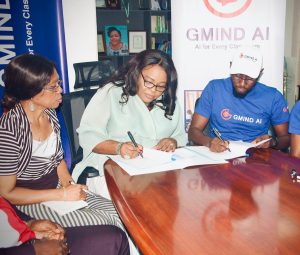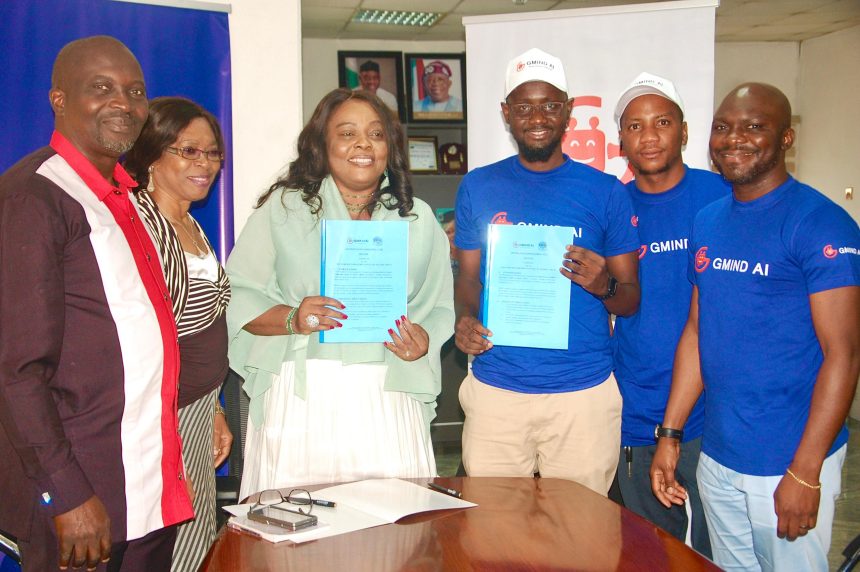In what could be Nigeria’s most ambitious classroom technology rollout, GMind AI – the AI-powered infrastructure transforming education has joined forces with the Teachers Registration Council of Nigeria (TRCN) to deploy a cutting-edge teaching platform for 1.5 million licensed educators in Nigeria.
The partnership, formalized in Abuja on Wednesday, August 13, 2025, aims to “reshape how teachers teach and how students learn,” according to GMind AI’s Director of Strategic Partnership and Innovation, Dr. Deji Ajani.
“We are building a costumized ecosystem that blends cutting-edge technology with Nigeria’s unique educational needs, empowering teachers, inspiring students, and redefining what’s possible,” he said.
The platform goes live October 6, with nationwide training beginning in September.

AI Tools for 1.5 Million Teachers
The GMind AI–TRCN platform will deliver contextualized and simulated lesson plans fully aligned with Nigeria’s curriculum. Unlike generic AI tools, it will embed local history, culture, and realities alongside global content.
This means students can learn about the Benin Kingdom in the same lesson framework as Victorian England, providing cultural balance.
“Technology must not erase identity,” said Dr. Ajani. “By building local relevance into global learning models, we ensure Nigerian students see themselves in the knowledge they consume.”
Massive Training Push
To ensure nationwide adoption, the partnership will roll out a national AI literacy program for 500,000 teachers and final-year student teachers.
The program begins with 2,500 master trainers in a “train-the-trainer” cascade model, covering all six geopolitical zones. Training will focus on AI in pedagogy, classroom assessment, and student engagement.
TRCN Registrar Dr. Ronke Soyombo described the training as “a game-changer” for teacher capacity.
“Once the burden of lesson planning is reduced, teachers can focus on creativity, adaptation, and meeting each learner’s needs,” she said.
Commenting on its originality, the registrar noted that the “GMind AI–TRCN platform will deliver contextualized and simulated lesson plans fully aligned with Nigeria’s curriculum. And, “unlike generic AI tools, it will embed local history, culture, and realities alongside global content.”
Inclusive, Custom-Built Platform
The TRCN AI platform built on GMind AI infrastructure will feature two distinct resource streams: AI-generated simulations for digitally skilled teachers, and ready-made, prescriptive lesson plans for those with limited ICT skills.
Lesson content will be tailored to gifted, average, and less able learners, ensuring no child is left behind.
“This isn’t just about technology for the tech-savvy,” said GMind AI’s Head of Product Development, Aisha Bello. “It’s about creating a system where every teacher, regardless of digital skill level, can deliver impactful lessons.”
Real-Time Insights for Policy Makers
TRCN will gain access to live dashboards tracking teacher engagement, platform usage, and growth in digital skills. This data will inform policy, guide teacher support, and help target resources to where they are most needed.
“Good data makes for smart decisions,” Dr. Ajani noted. “We’re not just giving teachers tools; we’re giving the system the intelligence to evolve continuously.”
National Impact and Global Ambition
The platform promises a transformative impact: teachers will see reduced workloads, improved lesson quality, and richer student engagement; students will experience more tailored and engaging learning.
Analysts say this could position Nigeria as a leader in Africa’s EdTech revolution.
“This initiative supports Nigeria’s ambition to build a knowledge-driven economy,” Dr. Ajani said. “It’s a model that other African nations could adapt for their own education systems.”
Why It Matters
Nigeria’s education system, serving over 45 million students, faces high pupil-to-teacher ratios, outdated teaching methods, and a literacy crisis where 70% of 10-year-olds cannot read a simple text, according to UNICEF.
The GMind AI–TRCN platform aims to tackle these challenges by equipping 1.5 million licensed teachers with AI-powered lesson tools and training 500,000 in AI literacy, one of the largest such programs globally.
Evidence from EdTech Hub suggests such tools can cut lesson prep time by 40% and improve student scores by up to 15%, positioning Nigeria as a potential continental leader in AI-driven education reform.
Talking Points
This partnership between GMind AI and TRCN is a timely and forward-looking intervention in Nigeria’s education sector.
Its emphasis on localized, AI-driven lesson planning directly addresses two long-standing bottlenecks, teacher workload and the lack of culturally relevant content, while also creating one of the largest AI-literacy drives in Africa.
The scale, reach, and data-driven approach have the potential to make Nigerian classrooms more efficient, engaging, and globally competitive.
However, the project’s success will hinge on sustained political will, strong institutional commitment from TRCN, and consistent funding to maintain both the platform and its training programs.
There is also the challenge of bridging Nigeria’s digital divide, ensuring teachers in remote or under-resourced areas can access and use the platform effectively.
GMind AI’s robust infrastructure is built to overcome these barriers with a cloud architecture optimized for low-bandwidth environments, offline access capabilities, and seamless mobile integration.
Coupled with TRCN’s nationwide trainer network, this ensures every licensed teacher, regardless of location or resources, can confidently adopt and benefit from AI-powered teaching tools.





